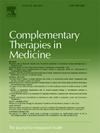一年后补充l -鸟氨酸治疗牙周炎比补充l -精氨酸效果更好:一项随机对照试验研究的第二部分
IF 3.5
3区 医学
Q1 INTEGRATIVE & COMPLEMENTARY MEDICINE
引用次数: 0
摘要
背景:l -精氨酸和l -鸟氨酸在牙周炎治疗中显示出有限的短期免疫益处。本研究的目的是评估l -精氨酸或l -鸟氨酸作为牙周治疗辅助药物对成人牙周炎患者的延长疗效和持久性。材料和方法在本研究中,在初步随机短期临床试验(NCT05042024)中,75名先前接受l -精氨酸或l -鸟氨酸作为专业机械斑块清除(PMPR)辅助治疗的患者在12个月的随访后进行临床和免疫学评估(巢式)。免疫分析包括CD68 + 和CD163 + 单阳性牙龈巨噬细胞密度的免疫组化鉴定。所有患者在观察期间均未接受新处方或饮食改变,并接受个性化牙周治疗步骤。结果一年后,与PMPR相比,接受l -精氨酸或l -鸟氨酸治疗的患者牙周袋深度为4-5 mm的部位明显减少(p <; 0.0001)。与PMPR和l -精氨酸相比,l -鸟氨酸与BoP降低相关(95 % CI比值比[1.12-1.46],p = 0.0002;CI [0.72 - -0.94], p = 0.004),CD68 + CD163 + 巨噬细胞密度增加而PMPR (p & lt; 0.001)和精氨酸(p & lt; 0.05)。与PMPR和l -鸟氨酸相比,l -精氨酸导致CD68 + 巨噬细胞密度增加,CD68 + /CD163 + 比值升高;CI (0.41 - -0.63), 0.009 p = ,CI [1.45 - -2.72], p & lt; 0.0001。结论1年后,补充l -鸟氨酸比l -精氨酸表现出更明显的临床益处,尽管两者都可以调节牙龈CD68 + 和CD163 + 巨噬细胞。本文章由计算机程序翻译,如有差异,请以英文原文为准。
L-ornithine supplementation in periodontitis treatment yields greater benefits than L-arginine after one year: Part II of a randomized controlled pilot study
Background
L-arginine and L-ornithine have previously shown limited short-term immunological benefits in the treatment of periodontitis. The aim of this study was to assess the extended efficacy and durability of the response to L-arginine or L-ornithine as adjuncts to periodontal therapy in adults with periodontitis.
Materials and methods
In this study, 75 patients who previously received the course of L-arginine or L-ornithine as adjuncts to professional mechanical plaque removal (PMPR) during a preliminary randomized short-term part of a clinical trial (NCT05042024) were assessed clinically and immunologically (nested) after 12 months follow-up. The immunological assay included immunohistochemical identification of densities of CD68 + and CD163 + single-positive gingival macrophages. All patients did not receive new prescriptions or dietary changes and underwent personalized steps of periodontal treatment during observation.
Results
After one year, patients who received L-arginine or L-ornithine exhibited a significant reduction of sites with periodontal pocket depth of 4–5 mm compared to PMPR (p < 0.0001). L-ornithine was associated with BoP decreasing compared to PMPR and L-arginine (95 % CI of odds ratio [1.12–1.46], p = 0.0002; CI [0.72–0.94], p = 0.004), CD68 + and CD163 + macrophages density increasing compared to PMPR (p < 0.001) and L-arginine (p < 0.05). L-arginine resulted in increased density of CD68 + macrophages and elevated CD68 + /CD163 + ratio compared to the PMPR and L-ornithine; CI [0.41–0.63], p = 0.009, CI [1.45–2.72], p < 0.0001.
Conclusion
After one year, L-ornithine supplementation demonstrated more pronounced clinical benefits than L-arginine, although both can modulate gingival CD68 + and CD163 + macrophages.
求助全文
通过发布文献求助,成功后即可免费获取论文全文。
去求助
来源期刊

Complementary therapies in medicine
医学-全科医学与补充医学
CiteScore
8.60
自引率
2.80%
发文量
101
审稿时长
112 days
期刊介绍:
Complementary Therapies in Medicine is an international, peer-reviewed journal that has considerable appeal to anyone who seeks objective and critical information on complementary therapies or who wishes to deepen their understanding of these approaches. It will be of particular interest to healthcare practitioners including family practitioners, complementary therapists, nurses, and physiotherapists; to academics including social scientists and CAM researchers; to healthcare managers; and to patients. Complementary Therapies in Medicine aims to publish valid, relevant and rigorous research and serious discussion articles with the main purpose of improving healthcare.
 求助内容:
求助内容: 应助结果提醒方式:
应助结果提醒方式:


